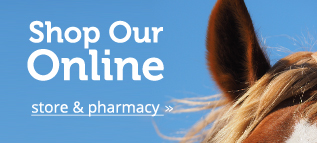Each year around this time, as the typical Florida winter weather sets in with temperatures ranging from 32 to 89+ degrees depending on the day of the week, we expect to receive calls from clients worried about their colicking horse. Today was a bit of a surprise though as we opened for business on a warm morning and had 3 colics all taking place at the same time, one unfortunately requiring surgical intervention. Colic is often the most common equine emergency treated and quick veterinary intervention is often required for a successful outcome, but what can you as a horse owner do to help prevent a colic. Dr. Jessica Van Scyoc wrote the following article discussing this very topic. We hope you enjoy.
"COLIC: RISK FACTORS AND PREVENTION"
By: Dr. Jessica Van Scyoc
Colic is the most common equine emergency we see. Unfortunately, horses have a lot of intestine (50 feet of small intestine alone in the average horse), which can easily displace, twist, swell, become gassy, or impact. Colic can vary from mild to severe and life-threatening. Here are some measures you can take to decrease your horse's risk for colic.
1- Encourage drinking. Changes in your horse's routine (weather changes, traveling, etc) can cause him to drink less. Decreased water intake can lead to impaction colic, so it is important to anticipate these changes and proactively add salt or electrolytes to feed, or even soak your horse's grain in water. An average horse will drink between 5 to 10 gallons of fresh water per day, so monitor your horse's intake closely during these times.
2- Regular dentals. Without regular dental work, your horse may not be able to chew effectively. Inappropriately chewed hay can cause impaction colic, so make sure your horse sees the dentist once a year.
3- Make feed changes slowly. Anytime you make a change in your horse's feed or hay, do so gradually. Sudden alterations in diet can cause drastic changes in the colonic pH, which alters microbial populations and causes intestinal dysfunction. Begin by adding a small amount of new feed to the routine feed, and gradually increase the amount of new feed while decreasing the amount of routine feed over a period of one week. Do not let your horse gorge on round bales if he is not used to them.
4- Deworm regularly. This is especially important for young horses who are prone to ascarid impactions.
5- Watch for sand. Sand impactions are a common cause of colic in Florida. Try to feed your horse from a feeder. If you must feed from the ground, rubber mats can be used to place feed and hay on to decrease sand intake. Also, discuss a good Metamucil therapy program with your veterinarian. Metamucil is thought to help bind and eliminate the sand in your horse's gut.
6- Know your horse. Certain breeds are predisposed to specific forms of colic. For instance, Arabians are more likely to develop enterolithiasis (stones in the colon) and Miniature horses are more prone to fecaliths (hardened fecal balls in the small colon). Age can also play a factor in the type of colic- older horses can develop benign, fatty tumors that wrap around the small intestine and cause life-threatening colic.
Although some forms of colic are preventable, others are spontaneous and occur for no good reason. If your horse does colic despite these measures, call the veterinarian right away. Prompt veterinary care puts you and your horse in the best situation for recovery.

